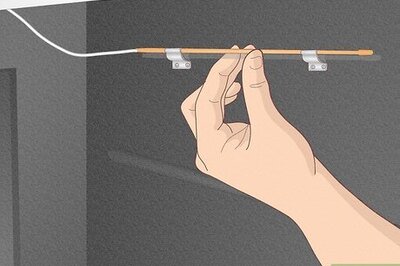
views
Celigny (Switzerland): Sri Lankan government and the Liberation Tigers of Tamil Eelam (LTTE) have renewed their commitment to a four-year ceasefire.
They have also agreed to meet again in two months to try to avoid another civil war.
After two days of talks, their first meeting since 2003, the two sides said they would return to Geneva on April 19 to continue discussions.
Both parties have agreed to try to end the violence in the island nation, which has killed 200 people since December 2005 with each side blaming the other for violating the truce.
The rebels had earlier accused Lankan army of firing on them on Thursday, a charge the army denied.
Both sides declared themselves happy with the outcome.
The Sri Lankan government had entered the negotiations with a demand for a new ceasefire, but climbed down amid growing foreign pressure to save the Norwegian-led and internationally-backed peace process, the sources close to the talks said.
Diplomats said Colombo had initially slammed the truce brokered by Norway as "unconstitutional and against the law," but expressed commitment to "respecting and upholding" it after the talks.
"The government has given in on the issue of amending the ceasefire," one informed source said.
"But it has been done in the interests of halting the killings."
Both the government and the LTTE were told by Sri Lanka's main international backers -- the US, Japan, the European Union and Norway -- that they must show flexibility, after a frosty start of the talks on Wednesday.
After a statement by the quartet demanding a spirit of accommodation at the Swiss talks, the two sides announced that they will take all measures necessary to stop "intimidation, acts of violence, abductions or killings."
Thursday's joint statement by the two sides was brief compared to declarations after their six rounds of peace talks held between September 2002 and March 2003.
Unlike in the past, the two sides also held separate press conferences.
Colombo's chief negotiator Nimal Siripala de Silva said the government saw Thursday's outcome as positive.
"We are aware that the path of peace is challenging," de Silva said. "Peace is not a cheap commodity that could be bought over the counter."
PAGE_BREAK
"We have also made compromises," the chief negotiator for the LTTE, Anton Balasingham, said.
"What the Tigers have done is to give an assurance that they will stop the killings," the diplomatic source said. "What the government has done is accept the ceasefire and in fact dropped demands for a revision."
At least 153 people were killed in a spike of violence between December and January before peace broker Norway clinched a deal to end a near three-year deadlock in the process and organised meetings here to talk about implementing the truce.
The move is a political U-turn for the new government of President Mahinda Rajapakse who came to power in November promising a brand-new peace process in a country where at least 60,000 people have been killed in violence since 1972.
The President had already made another U-turn by inviting Norway to remain as peace facilitator after promising to his Marxist allies before his election that Norway will be booted out of the process.
Norwegian peacebroker Erik Solheim, who had been branded by President Rajapakse's allies as a "white Tiger" for allegedly backing the Tigers, said the parties showed better mutual confidence after the talks.
"I'm happy to announce that the parties have agreed to a new meeting to discuss the ceasefire agreement," Solheim said. "That showed the confidence built during the talks."
The government and the Tigers, who are seeking independence for Sri Lanka's Tamil minority, wrangled for months over the venue for this week's talks before agreeing that they would hold them in neutral Switzerland.
The talks were held away from the public and media glare at the Ecumenical institute at the Chateau de Bossey located about 15 kilometres (10 miles) from Geneva.
The Institute says that many who attended seminars and conferences there have testified to "life changing experiences," but that would be tested when Sri Lankan parties return in two months.
(With inputs from AFP)




















Comments
0 comment